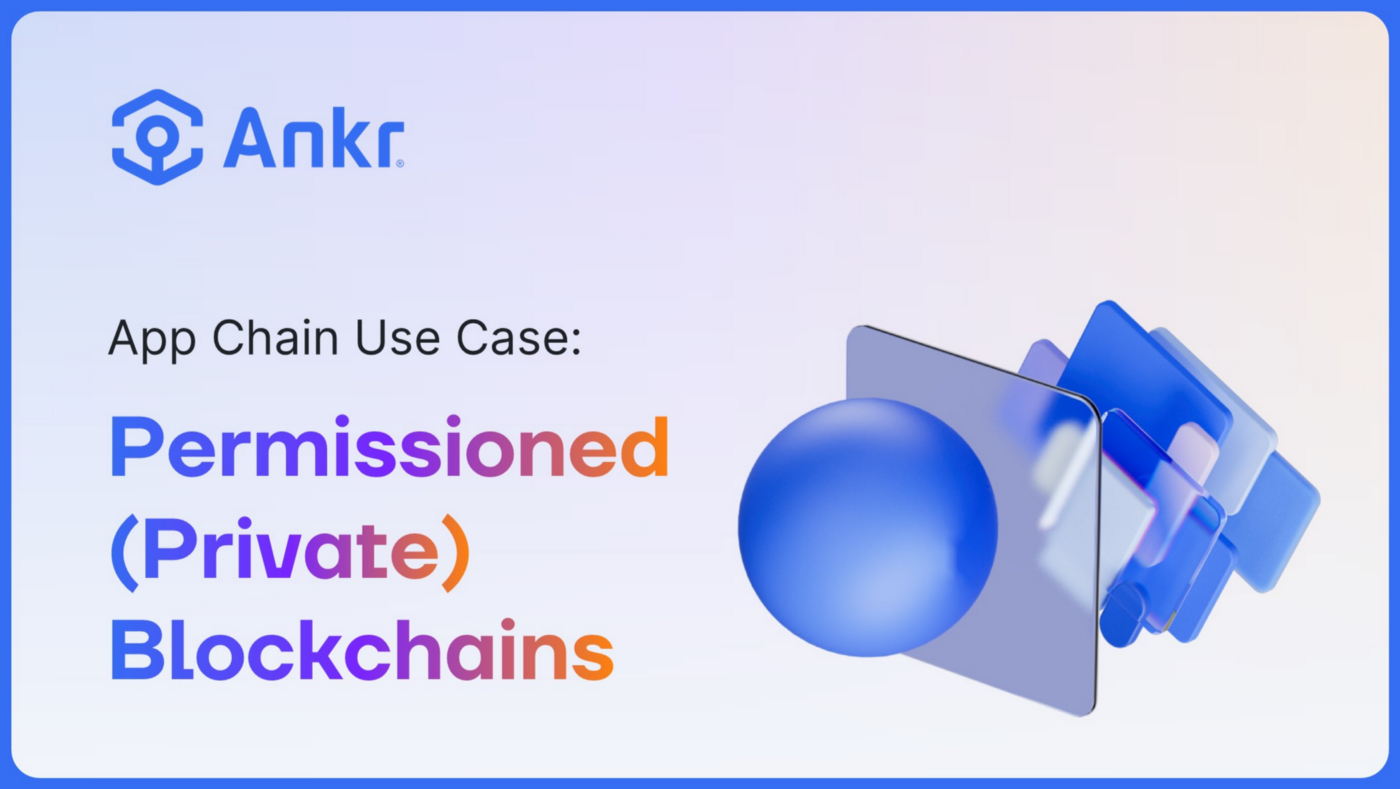AppChain Use Case: Permissioned (Private) Blockchains

Kevin Dwyer
October 27, 2022
7 min read

Most blockchains, such as the Ethereum network and other EMV-compatible networks, are permissionless, which implies that anybody may access, build on, and participate in the network by hosting a node. These permissionless blockchains run on a transparent, public ledger that is shared by all network nodes. However, there is another less-explored blockchain: a permissioned network. This post will look at what a permissioned blockchain is, what sectors and use cases it can be used for, and how it can be linked with Ankr App Chains. Let us begin!
Overview of Application Chains
First, a short review on App Chains, which are dedicated sidechains allowing developers to modify their own blockchain protocol with plug and play tools to meet their specific demands. They're effectively a blank canvas for developers to construct products with no limits and complete customizability, which are then anchored to some of the largest blockchains in existence, such as BNB Chain, Avalanche, or Polygon. However, because of their versatility, they might be difficult to design if you don't have a lot of Web3 programming knowledge. That's where Ankr's App Chain solution comes in to support people in need. This service tackles the most difficult aspects of developing, deploying, and growing dApps on App Chains.
While developers and commercial customers may tremendously benefit from operating their projects on App Chains with Ankr, we think there is also a market fit for enterprise-level users like as banks, private firms, and even governments and CBDCs.
But, before we go too far into permissioned App Chain connections, let's first go over what permissioned blockchains are, how they function, and who may want to use them.
What Are Permissioned Blockchains?
Permissioned blockchains are blockchain networks that incorporate an access control layer. That implies there is a central authority in charge of controlling who may access and utilize the blockchain. Users will require unique access keys in this system to see data, interact with data, or validate transactions on the network.
Permissioned blockchains, often known as private blockchains, are similar to blockchain networks but lack the decentralization. That may sound strange. Who would want to utilize anything like that? Private blockchains are being considered by a number of sectors, including some of the world's biggest.
Permissioned Blockchain Use Cases
Enterprises are the most likely candidates for permissioned or private blockchains. They may desire the usability advantages of blockchain technology but must keep some data secret for regulatory concerns or not share critical business information with rivals.
Private banks
Banks are a big prospective consumer of private blockchain networks. Blockchain technology enables banks to conduct cross-border transactions rapidly and seamlessly. However, it is uncommon in conventional banking to show account balances in a public database or shared ledger. In blockchain, however, a simple block explorer can tell you the balance of any wallet address.
Many banks, including City, HSBC, and JPMorgan, have already begun investigating and implementing varying degrees of blockchain technology integration. JPMorgan, for example, established the Interbank Information Network (IIN) in 2018 to promote the seamless, worldwide transmission of data between banks with improved data access control. In other words, it's a mechanism that allows banks to communicate some information with one another while keeping other information secret. It is an endeavor to reduce friction and allow participating banks to send important information instantly in order to achieve speedier payment completion — and more than 300 institutions have already indicated their desire to join this network.
Central banks and CBDCs
Central bank digital currencies (CBDCs) are digital versions of a country's official currency issued by its central bank. Unlike conventional cryptocurrencies such as bitcoin (BTC) or ether (ETH), the monetary supply policy of a CBDC is governed by a central authority: the central bank. CBDCs are so distinct from the digital assets found on public, transparent blockchain networks such as Bitcoin and Ethereum. Having said that, numerous central banks have indicated an interest in establishing CBDCs utilizing blockchain technology – private, permissioned blockchain technology, of course.
Supply Chain
As supply chains investigate the potential of blockchain technology, the requirement for permissioned blockchain architecture becomes evident. Permissioned blockchains are a viable solution that is gaining traction in this market for keeping supply chain data correct from end to end and limiting access to only trustworthy parties.
Insurance
Private blockchains may also aid the insurance industry's transition to Web3 and the adoption of blockchain technology by improving privacy for sensitive, evidence-based data and allowing better-permissioned data exchange through a complex network of linkages. Insurance companies profit considerably from incorporating blockchain technology, which allows automated claim payments, fraud reduction, and the possibility to significantly decrease overhead costs by lowering the number of intermediate parties required to process claims.
Healthcare
The healthcare business, like the insurance industry, deals with extremely sensitive data that is regulated and safeguarded by the strictest regulatory frameworks. As a result, medical data access control is crucial. However, it is equally vital that medical data be shared safely, securely, and rapidly across various healthcare institutions such as hospitals, offices, and medical experts that may be situated in completely different regions of the globe. The data transmission requirements of the healthcare sector as a whole reflect the kind of massive throughput that necessitates sophisticated enterprise-grade infrastructure solutions.
The Future of Private Blockchains
These are just a few of the numerous sectors that blockchain technology may enhance by enhancing automation, decreasing latency and friction across businesses, and lowering overhead costs – all while maintaining safe data access control through permissioned blockchain infrastructure. Enterprises may get the same security, immutability, and transferability that comes with a public distributed ledger while still preserving additional steps to manage access to sensitive data via permissioned blockchains.
Given the massive magnitude of the sectors interested in and researching permissioned blockchain technology, assisting in the onboarding of these business customers would be a huge advantage to the Web3 ecosystem as a whole. There will always be a need for private data (such as medical records, insurance claims, bank statements, supply chain records, and so on), thus we feel we should assist in integrating such requirements inside the greater Web3 framework of blockchain technology. Just because there is a huge need for decentralized blockchain networks doesn't imply there isn't also a huge demand for private networks in specialised businesses.
We think that banks, government agencies, and privacy-related companies will not go away. In reality, there will almost certainly always be a demand for privacy-focused data sharing capabilities in areas such as insurance, health care, supply chain, and others. However, we think that these entities will eventually migrate to Web3. Rather of resisting their involvement, we should make it simpler for them to join and give them with the tools they need to better their operations and become more efficient.
Permissioned Blockchains as Ankr App Chains
Ankr thinks that whenever these businesses shift to Web3, these are the sorts of networks they will most likely seek. Furthermore, these sectors represent long-established conventional firms whose whole tech stacks reside in Web2 – implying that they are unlikely to have significant Web3 knowledge or competence. These businesses also generate enormous volumes of data and transaction processing due to their scale. These characteristics combine to make them ideal candidates for permissioned blockchain infrastructure linked with Ankr App Chains.
For a few essential reasons, App Chains stand out as a distinct and strategic option for business users. App Chains, specifically, provide:
Massive enterprise-grade throughput
High customizability to meet the unique demands of these sectors The main problem for these conventional organizations wishing to join Web3 is a lack of technical experience and Web3 understanding, which is where Ankr's App Chains solution shines. With our solution that manages everything from start to finish for consumers, Ankr can considerably decrease the technical barrier to developing a dedicated App Chain.
Typically, building a blockchain — sidechain, mainchain, or otherwise — includes bootstrapping all of the infrastructure for validator nodes, RPC nodes, block explorers, testnets, faucets, staking mechanisms, and more. However, with Ankr's new App Chains, any Web3 developer can quickly establish a new App Chain, complete with all of the infrastructure mentioned above.



